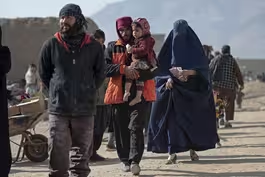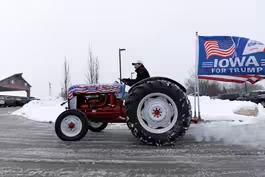
How communities are tackling a suicide crisis among farmers
Clip: 1/14/2024 | 9m 9sVideo has Closed Captions
How rural communities are tackling a suicide and depression crisis among farmers
More than 50,000 Americans took their own lives in 2023, the nation’s highest yearly rate of suicide on record. Farmers are 3.5 times more likely to die by suicide than the general population, according to the National Rural Health Association. Special correspondent Megan Thompson reports from Wisconsin on the burden farmers often deal with and what’s being done to help them.
Problems playing video? | Closed Captioning Feedback
Problems playing video? | Closed Captioning Feedback
Major corporate funding for the PBS News Hour is provided by BDO, BNSF, Consumer Cellular, American Cruise Lines, and Raymond James. Funding for the PBS NewsHour Weekend is provided by...

How communities are tackling a suicide crisis among farmers
Clip: 1/14/2024 | 9m 9sVideo has Closed Captions
More than 50,000 Americans took their own lives in 2023, the nation’s highest yearly rate of suicide on record. Farmers are 3.5 times more likely to die by suicide than the general population, according to the National Rural Health Association. Special correspondent Megan Thompson reports from Wisconsin on the burden farmers often deal with and what’s being done to help them.
Problems playing video? | Closed Captioning Feedback
How to Watch PBS News Hour
PBS News Hour is available to stream on pbs.org and the free PBS App, available on iPhone, Apple TV, Android TV, Android smartphones, Amazon Fire TV, Amazon Fire Tablet, Roku, Samsung Smart TV, and Vizio.
Providing Support for PBS.org
Learn Moreabout PBS online sponsorshiprate of suicide on record.
What leads to someone# suicide can be a mystery to loved ones because## they were reluctant to talk about their struggles.# Special correspondent Megan Thompson reports from## Wisconsin on the burdens farmers often have to# deal with and what's being done to help them.
BRENDA STATZ: Oh my that Buffy# tan they're so pretty.
I hear you.
MEGAN THOMPSON (voice-over): Days# start early for Brenda Statz.
BRENDA STATZ: Usually 4-4:30# a.m. wide awake so I get up,## get chores done usually do chores in the dark.
MEGAN THOMPSON (voice-over): Statz runs# this 300 acre farm in southwes with her two sons and her daughter in# law.
The farms been in the family for## 50 years.
Brenda's husband Leon# inherited it from his parents.
BRENDA STATZ: We met in 1981.
My senior# year of high school.
He just loved the kids,## love the farm, showing them how to farm.
MEGAN THOMPSON (voice-over): But farming is# a hard way to earn a living.
Brenda works a## second full time job in town to give# the family health insurance and extra## income.
After the birth of her second# son in 1989, Brenda left her job for a## while to care for the kids.
Leon and the# farm became their only source of income.
BRENDA STATZ: He told me that# one day he says if I fail,## we all fail.
And that's when his first bout# with depression started.
He couldn't function,## couldn't get up in the morning# couldn't get down to the barn.
MEGAN THOMPSON (voice-over): Leon# struggled on and for years the weight of running a# farm at times the Statz's sold their dairy herd and started# raising beef cattle.
But Leon came to regret it.
BRENDA STATZ: He said I should have kept# my cows.
I'm a failure.
I wasn't good at## farming even though we were financially we were# fine.
But his mind would not let him see that.
MEGAN THOMPSON (voice-over): In October# of 2018, Leon Statz took his own life.
BRENDA STATZ: Whether he's here or not,# somebody still had to get up the next day## and feed the cows.
Somebody had to get up# and do the chores.
The cro be harvested that year.
There's so much that# has to do you didn't have time to just MEGAN THOMPSON: Enough time to grieve really.
BRENDA STATZ: No.
MEGAN THOMPSON (voic than the general population according to# the National Rural Health Associ KAREN ENDRES, Farmer Wellness# Program Coordinator: Farmers## face really unique stres MEGAN THOMPSON (voice-over): Karen# Andres coordinates Wellness Programs## at the Wisconsin Farm Center, a state ag KAREN ENDRES: They are working in# very complex markets.
They are often## dealing with things like weather# that are out of their control.
MEGAN THOMPSON (voice-over): Endres says# most farms are run by families which can## cause conflict and stress at home.
Farmers# are also operating in isolated ru KAREN ENDRES: They can feel very alone like# they are on an island and they also have access## to a lot of things like large equipment,# firearms, things that can cause self-harm.
RANDY ROECKER, Wisconsin Dairy Farmer: Everybody# thinks farming is the red barns you know and the## white fences and things like that.
But# what goes on behind the scen constantly the stress you know of the markets,# animals get sick things happen.
Come on.
MEGAN THOMPSON (voice-over): Randy Roker runs# his family's dairy farm just a few miles from## Brenda Statz.
He says things are tough right now# for dairy farmers.
We're an d sky high costs for feed and fertilizer# will being paid a low price for their milk.
RANDY ROECKER: There we go all in.
We do such# a good job producing a wholesome product for## everybody.
And yet, we aren't even making# enough money to cover our cost of operating.
MEGAN THOMPSON (voice-over): Roecker's# grandparents started the farm in the 1930s when## Roecker took over, he invested millions of dollars# in a new barn and state of t RANDY ROECKER: So we completed that just in time# for 2008 when the worldwide financial crisis yet.
MEGAN THOMPSON (voice-over): Milk prices# tanked, and Roecker couldn't pay his bills.
RANDY ROECKER: I would get in the truck,# and I would drive out on our back 40 acre## field and sit in the truck and just cry.# I never thought depression would happen## to me.
But this financial struggle and# feeling that you're losing this legacy## that your grandfather started and it# just really played a lot with my mind.
MEGAN THOMPSON (voice-over): Roecker saw several# therapists but none were farmers themselves.
RANDY ROECKER: I went to so many different ones# and that one understood what I was going through.
MEGAN THOMPSON (voice-over): But after# about six years, Roecker recovered,## then came the death of his neighbor, Leon# Statz.
In his obituary, Leon's family w clear about what happened writing he passed# away after a long fought battle with depression.
BRENDA STATZ: And my kids and# I, when we wrote the obituary,## we all met at the funeral home and they says,# ne ed the reality check this happens.
We need to# own it.
And now where are we going from here.
MEGAN THOMPSON (voice-over): Randy Roecker who's## known Brenda since hig RANDY ROECKER: They overheard some# people talking about Leon.
And I said,## you just don't have any idea.
You don't# know what we're going through ou MEGAN THOMPSON (voice-over):# Roecker and Statz felt they## needed to do something RANDY ROECKER: We're bringing# mental awareness into the light## and we're making it okay to talk about it.
BRENDA STATZ: Farmers can tell# a story about getting hurt,## or you know, whatever else is going on,# but to say that they're just in a re bad place.
They're really blue.
They just# can't get going.
They'll never admit that.
MEGAN THOMPSON: Why can't they admit that?
BRENDA STATZ: Becaus MEGAN THOMPSON (voice-over):# To counter that stigma, Statz,## Roecker and their volunteers set up a b community and give talks to spread the# word about suicide prevention programs.
BRENDA STATZ: 988 is there as a support.
MEGAN THOMPSON (voice-over): And th BRENDA STATZ: We are not mental health people.
But# when I went through everything with Leon,# I didn't know of any resources at the time.
MAN: Welcome to Mental Health First Aid.
MEGAN THOMPSON (voice-over): Other groups in Wisconsin are teaching people who interact# with farme and intervene anyone from a neighbor# to veterinarians who visit the farm.
MAN: What you can do is say Bob,# I'm still concerned about what I've## noticed.
And I want you to know that# I'm available to talk to you anytime.
MEGAN THOMPSON (voice-over): And at the Wisconsin# Farm Center, Karen Endres helps get farmers## vouchers to cover the cost of counseling, and# help locating therapists to like Megan W MEGAN WOLF, Therapist: Karen# will call me and she'll ask hey,## do you have room for and then# ME GAN THOMPSON (voice-over):# Wolf also grew up on a hog farm.
MEGAN WOLF: I definitely think having a# farming background helps b immediately.
Right?
You don't have to# explain it to me, MEGAN THOMPSON (voice-over): Wolf understands# a farmer's schedule and stays flexible.
MEGAN WOLF: If they have a go day like their# crop is ready, that means thei is happening.
And you have to be okay with that# as a therapist.
A rainy day like today it's a## great day for me to connect with some of my# farmers, especially if you have telehealth.
One of the things that I know# that you've struggled with lately.
MEGAN THOMPSON (voice-over): Wolf says telehealth# is n especially in small towns where# everyone seems to know everybody.
MEGAN WOLF: A lot of times we find also# that telehealth reduces the stigma the shame of maybe walking into a# building where people know that oh,## that's the therapist.
A lot of my farmers# I see are not even in southwest Wisconsin.## I don't know them.
I don't know# their family.
They don't know me.
MEGAN THOMPSON (voice-over): And with# the vouchers the state of Wisconsin## offers an appointment with Wolf KA REN ENDRES: The demand for vouchers# has grown tremendously.
Last year,## we had a record high.
We# paid for 217 appointments.
MEGAN THOMPSON: What do you think# explains that increasing demand?
KAREN ENDRES: I think awareness.
MEGAN THOMPSON (voice-over): Brenda Statz,## Randy Roec BRENDA STATZ: I don't want Leon's death# and his life to be meaningless.
What we## went through together has taught me# so much that if I can pass that on to## someone else who's struggling# and trying to find their way,## maybe it'll give them hope that there is help# out there.
You don't hav MEGAN THOMPSON (voice-over): For PBS News Weekend,# I'm Megan Thompson in Logan Ville, Wisconsin.
JOHN YANG: If you or someone you# know is having thoughts of suicide,## call or text the National Suicide Prevention# Lifeline at 988 or go onli
Inside Afghanistan’s worsening humanitarian disaster
Video has Closed Captions
Clip: 1/14/2024 | 6m 36s | Inside Afghanistan’s worsening humanitarian disaster as aid funding falls short (6m 36s)
What Iowa voters are thinking on frigid eve of 2024 caucuses
Video has Closed Captions
Clip: 1/14/2024 | 5m 43s | What Iowa Republican voters are thinking on frigid eve of 2024 caucuses (5m 43s)
Providing Support for PBS.org
Learn Moreabout PBS online sponsorship
- News and Public Affairs

FRONTLINE is investigative journalism that questions, explains and changes our world.

- News and Public Affairs

Amanpour and Company features conversations with leaders and decision makers.












Support for PBS provided by:
Major corporate funding for the PBS News Hour is provided by BDO, BNSF, Consumer Cellular, American Cruise Lines, and Raymond James. Funding for the PBS NewsHour Weekend is provided by...

